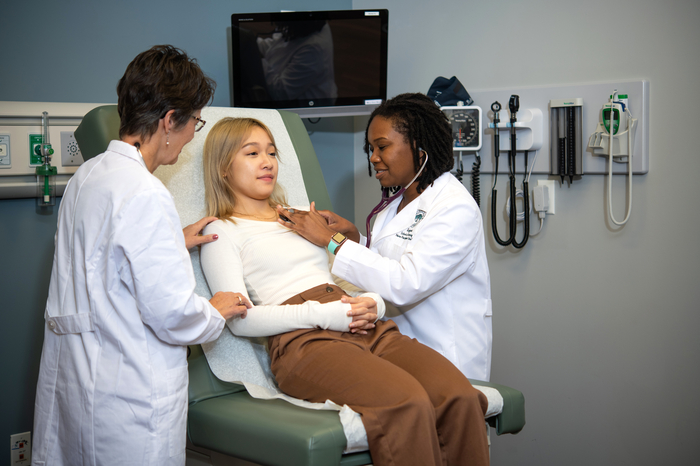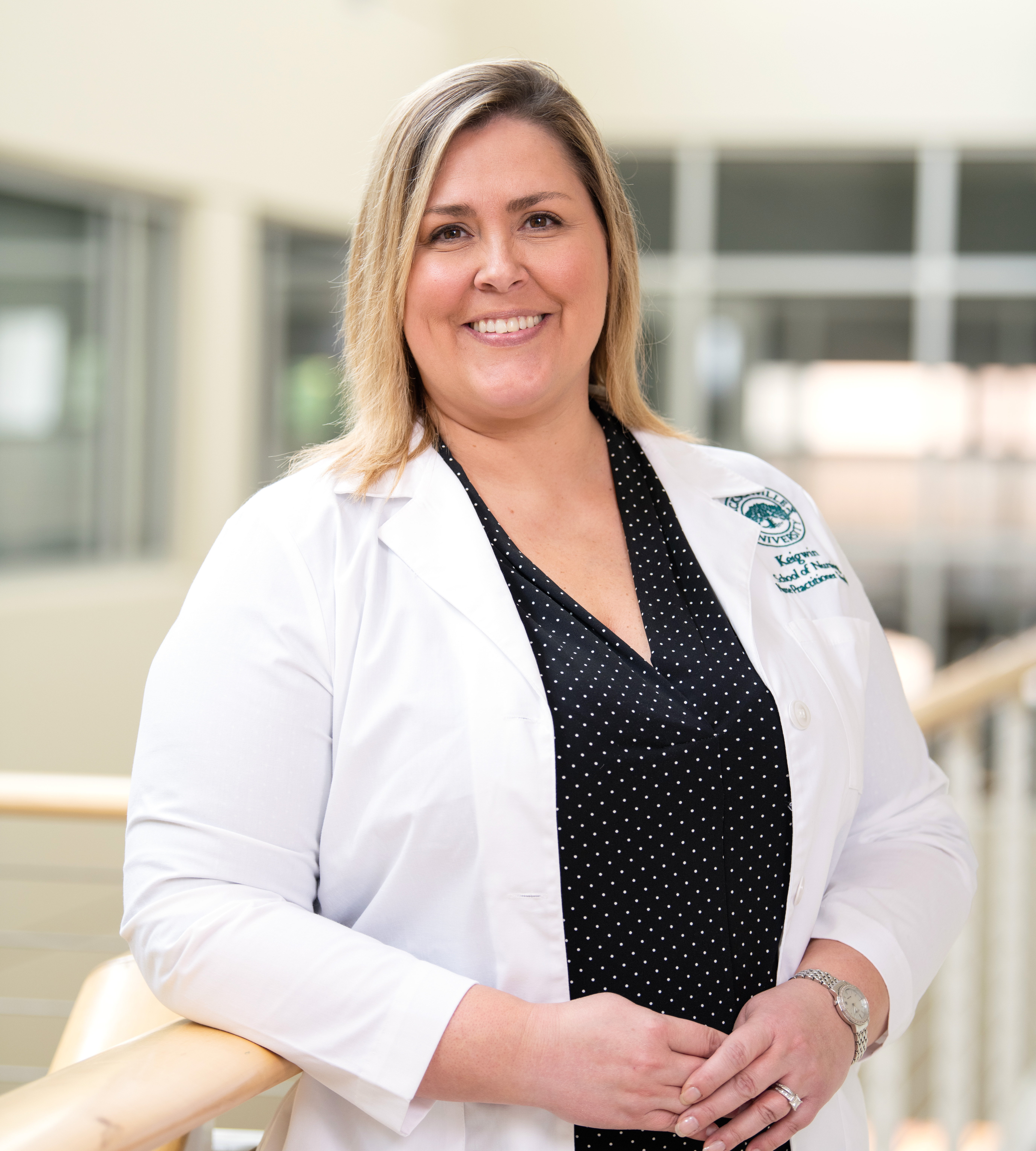Take Your Nursing Career to the Next LevelBSN-DNP

Why Choose Our Program?
The Bachelor of Science in Nursing to Doctor of Nursing Practice (BSN-DNP) program is a dynamic program that prepares nurses for leadership positions in multiple domains of healthcare. Students are prepared with the skills necessary to impact health outcomes and transform healthcare delivery. Graduates leave this program ready to begin a career at the top of their profession, with the knowledge of disciplines including nursing, economics, informatics, education, and health policy. The BSN-DNP is a terminal degree that prepares nurses in the application of research to clinical nursing practice at the highest individual, population, and systems levels.
What We Offer:
- The BSN-DNP Family Nurse Practitioner cognate is for BSN nurses who wish to pursue graduate education as an Advanced Practice Nurse and complete the DNP degree concurrently.
- The BSN-DNP Leadership cognate is for BSN nurses who wish to pursue careers in leadership positions within the healthcare system.
- The BSN-DNP Adult Gerontology Acute Care Nurse Practitioner cognate is for BSN nurses who wish to pursue their DNP degree and specialize in the treatment of adults with critically complex and acute episodic illnesses.
- The BSN-DNP Psychiatric Mental Health Nurse Practitioner cognate will help BSN students, who wish to obtain their DNP, demonstrate critical thinking and decision-making skills in evaluating the health of individuals and families suffering from mental health issues.
If you have already earned a Master of Science in Nursing (MSN), you may be interested in our Post-MSN Doctor of Nursing Practice (DNP).
START YOUR APPLICATION
Virtual Information Session
Attendees will have the opportunity to meet with faculty and an admissions counselor to ask questions about our curriculum and admissions process.
Monday, June 3, 2024
3:00 p.m.

Become A Leader in Family MedicineAbout Our Program
Curriculum
All Bachelor of Science in Nursing (BSN) to Doctor of Nursing Practice (DNP) students are required to complete the following coursework:
BSN-DNP Core
- NUR 514 - Nursing Leadership and Advanced Roles
- NUR 520 - Nursing Theory and Research II
- NUR 610 - Info Sys & Tech of Advanced Practice
- NUR 630 - Epidemiology and Biostatistics
- NUR 652 - Evidenced Based Practice I
- NUR 660 - Ethics in Clinical Practice
- NUR 670 - Leadership and Health Policy
- NUR 690 - Evidence Based Practice II
- NUR 702 - DNP Practice Project
- NUR 703 - DNP Residency
In addition to the BSN-DNP Core, all BSN-DNP students will complete one of the following cognates:
BSN-DNP Family Nurse Practitioner cognate
- Students who select the BSN-DNP/FNP cognate will take 70 credit hours post BSN degree. BSN-DNP/FNP students must complete 1000 total clinical and residency hours prior to awarding this degree and the student practicum and residency courses assure this requirement is met.
- Students who select the BSN-DNP/Leadership cognate will take a minimum of 59 credit hours post BSN degree. BSN-DNP students must complete 1000 residency hours prior to awarding this degree.
Discover a Modern Nursing EducationImmersive Learning in Healthcare
Dive into a unique learning experience; with Jacksonville University's Keigwin School of Nursing. Students will be immersed in experiential learning utilizing virtual reality labs, telepresence robots, simulation scenarios, and research, giving them first-hand knowledge of patient care.
Immersive Learning in Healthcare
My name is Amber Santos and I am the Director of Innovation and Quality. And what that just means, is that part of my job is to bring [in] innovative active learning into our curriculum. It’s important for a nursing school to continually evolve. We can’t just do the status-quo type of learning and education that we’ve always done. We need to evolve as a school, and part of that is bringing in the technology needed for today’s students in today’s healthcare.
We’re seeing VR explode in the training industry for a lot of different reasons. We
started looking at software that’s out there for the nursing program. There’s actually
a surprising number of products that tailor to this type of experience, training nurses
and other medical professions. Share Care U has excellent graphics that lets you go
inside the human body and see different parts of anatomy and physiology, and then
a few others [that] provide simulation experiences where you’re actually in the hospital
next to a patient conducting procedures.
Virtual Reality is an immersive learning tool that we use, and once they put on those
goggles they’re literally immersed into that environment. So, we can talk in the classroom
about plaque buildup in our arteries and atrial sclerosis, but when they get into
that VR world, this immersive world, they get to actually see it and they get to interact
with it. [So] they can see how the blood flows through a vessel and how over time,
plaque builds up. And then they can also click a box and see how a stent is placed
into the vessel. So, it really just immerses them, and it provides a deeper level
of learning and understanding.
My name is Melissa McCray and I am the Student Success Specialist and an assistant
professor with the Keigwin School of Nursing. What helps nursing students be successful
in nursing school is the use of technology; that’s really a key component. What we
are seeing more and more, is very tech-savvy nursing students and that’s great because
when you’re in the field of nursing, technology is being introduced every day. And
so it’s important that those students are educated in our nursing programs to use
some of this technology and interact with that technology. Like I can spin the lungs.
Sorry, I’, geeking out a little, there are a lot of secondary benefits from the type
of learning we’re providing to our students. It can be just them being a little bit
more familiar with the technology, so when they see it in the healthcare setting,
and they see a telepresence robot rolling down the hall of the facility they’re working
in, they will already have seen that and they will understand how to interact with
that and communicate. They will also understand that even though that’s a telepresence
robot that could be a family member on the other end, so they still have to have that
caring spirit of a nurse. And part of that is worked into our simulations so that
they understand that while technology is a wonderful thing, it can never replace the
impact a nurse can have. The caring part of what we do.
Graduate and Post-Graduate Program OptionsExplore Your Options
In addition to our Bachelor of Science in Nursing to Doctor of Nursing Practice (BSN-DNP) program, we also offer other options, including a Post-MSN DNP for students who already have a Master of Science in Nursing (MSN).
How to Apply
- Completed JU Application
- Unofficial Transcripts from all colleges and universities attended with All Nursing
Coursework & Nursing Degrees
- If the candidate attended a college or university abroad, an official NACES evaluation of that transcript is required. Choose the course-by-course evaluation with the GPA option.
- A minimum 3.3 undergraduate nursing GPA on a 4.0 scale is required
The following may be requested of students with a GPA of 3.3 or below- GRE/GMAT scores
- Letters of Recommendation
- Graduation from a regionally accredited program and CCNE, NLN, or ACEN accredited program
- Resume or Curriculum Vitae
- One year of critical experience is required (if applying to the AGAC program)
- Statement of Intent
- Virtual Interview (if applying to a nurse practitioner track)
- Active U.S. Nursing License
- Out-of-state applicants must be eligible for endorsement in Florida
- International students must hold a current license from a U.S. state and be eligible for endorsement in Florida.
- All international students whose first language is not English are required to submit proof of their proficiency in English, by providing scores for either: IELTS or TOEFL. If submitting score reports, they must be sent directly to Jacksonville University from the testing institutions.
Request for Information
Contact Information Keigwin School of Nursing
Phone: (904) 256-7000
Email: graduateadmissons@ju.edu
